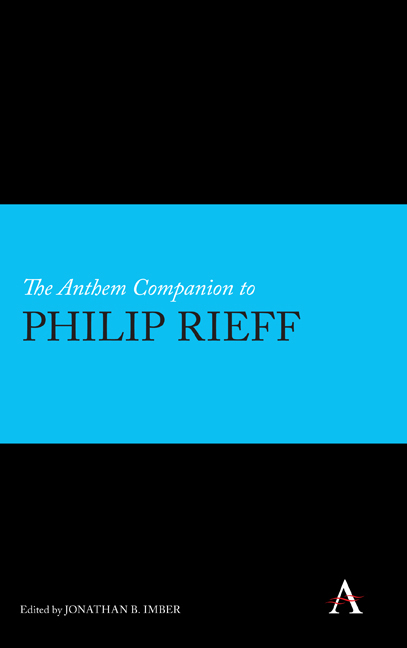Book contents
- Frontmatter
- Contents
- Introduction
- Chapter 1 Philip Rieff: Some Reflections
- Chapter 2 Philip Rieff and the Impossible Culture
- Chapter 3 Philip Rieff as Cultural Critic
- Chapter 4 Philip Rieff as Teacher
- Chapter 5 Prophet v. Stoic: Philip Rieff's Case against Freud
- Chapter 6 Decline and Fall in the Work of Philip Rieff: “I love the old questions” Beckett, Endgame
- Chapter 7 Philip Rieff as Social/ Cultural Theorist
- Chapter 8 Fellow Sons
- Chapter 9 Philip Rieff and Social Theory
- Chapter 10 A Kindly Apocalypse: Philip Rieff and the Endgame of the Therapeutic
- Chapter 11 Disenchantment, Authenticity and Ordinary Charisma
- Writings of Philip Rieff
- List of Contributors
- Index
Chapter 4 - Philip Rieff as Teacher
Published online by Cambridge University Press: 21 June 2018
- Frontmatter
- Contents
- Introduction
- Chapter 1 Philip Rieff: Some Reflections
- Chapter 2 Philip Rieff and the Impossible Culture
- Chapter 3 Philip Rieff as Cultural Critic
- Chapter 4 Philip Rieff as Teacher
- Chapter 5 Prophet v. Stoic: Philip Rieff's Case against Freud
- Chapter 6 Decline and Fall in the Work of Philip Rieff: “I love the old questions” Beckett, Endgame
- Chapter 7 Philip Rieff as Social/ Cultural Theorist
- Chapter 8 Fellow Sons
- Chapter 9 Philip Rieff and Social Theory
- Chapter 10 A Kindly Apocalypse: Philip Rieff and the Endgame of the Therapeutic
- Chapter 11 Disenchantment, Authenticity and Ordinary Charisma
- Writings of Philip Rieff
- List of Contributors
- Index
Summary
I first met Philip Rieff as my teacher in graduate school, where he introduced me to his view of what sociological theory included and his method of “unpacking” a text. It was at once familiar and strange in that the texts he included were not only ones I had long ago learned were part of the sociological canon— Weber and Freud— but also ones that seemed far afield— Oscar Wilde and Shakespeare. As for “unpacking,” he did not really explain what he meant by this term, but simply led the class into some explication- du- text word by word and line by line, expanding and plumbing its meaning, often leading off into digressions and what he called “lecturettes.” As we went on, he began pushing us, by virtue of his daunting presence, to interpret and explain what the author meant in each passage and, in the process, not only uncover why and how one sentence led to the next but force us to make explicit what was implicit in such a way that, if we succeeded, we would discover the inevitability of each successive development of the writer's idea and see what was at stake in his (there were no texts in my time written by women that he selected) vision. In that way, we would not only comprehend what we were reading but also gradually learn to fill in the blanks, even as we became so familiar with what we were reading that our thinking became shaped by it. His role as teacher was to steer us in our efforts, occasionally by offering his own reading or more commonly by questioning our own— sometimes brutally— until we were certain we had gone as far as we could with what was before us on the page.
Not everyone managed equally well to plumb the full depths of the text to our teacher's satisfaction. I recall one young woman, who was so intimidated by the class that she had carefully prepared notes in the spaces on the page for nearly each sentence, and when called upon to unpack, read them aloud only to have Rieff announce with something between contempt and exasperation: “[W] e shall now be regaled by Ms. R's marginalia.”
- Type
- Chapter
- Information
- The Anthem Companion to Philip Rieff , pp. 65 - 76Publisher: Anthem PressPrint publication year: 2018

